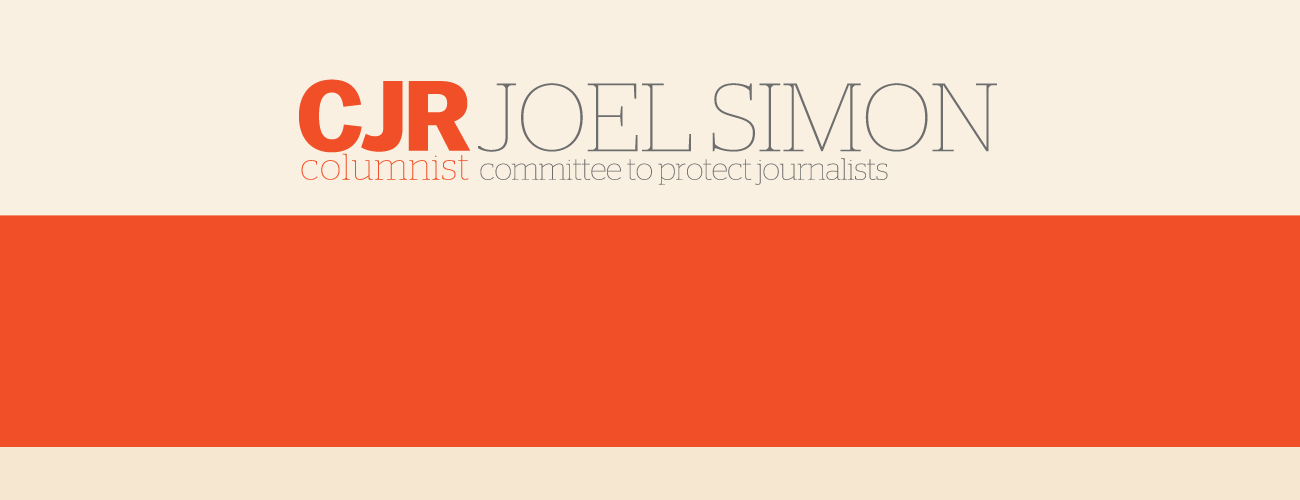The United Nations General Assembly gets underway this week in New York, and beginning next Tuesday, 195 leaders from around the world will parade before the UN’s green marble rostrum and deliver speeches. While the General Assembly may not be the world’s most productive meeting, it cannot be denied that everyone gets to have their say.
Indeed the entire UN system places an extraordinary value on speech as a tool for resolving differences and managing international conflict. But on the world stage, it is often only government officials who have the chance to speak freely. Around the world, freedom of expression is under siege, and journalists are being jailed in record numbers. The UN must take action.
After all, Article 19 of the Universal Declaration of Human Rights–a founding document of the UN–states that, “Everyone has the right to freedom of opinion and expression; this right includes freedom to hold opinions without interference and to seek, receive and impart information and ideas through any media and regardless of frontiers.” Even though it was drafted in 1948, the open-ended language has been widely interpreted to protect free speech online.
This fundamental right is not widely respected in practice–witness, for example, media crackdowns in China, Egypt, Turkey, and Ethiopia–and because enforcement mechanisms are weak or nonexistent, there is little that can be done with the UN system to ensure compliance.
That is why some leading experts on free expression are proposing a new strategy focused on codifying and strengthening “norms,” or agreed upon standards. “Unnoticed by many of us, a great power struggle over the shape, terms, and limits of free expression is raging around us, inside the box in your pocket and perhaps even inside our heads,” noted Timothy Garton Ash in his book published earlier this year, Free Speech: Ten Principles for a Connected World.
Ash, who as a journalist is one of the leading chroniclers of the transformation of Eastern Europe, is on the faculty at Oxford University, where he has established a website, Free Speech Debate, that explores the role of “free expression in an interconnected world.” This semester, he’s a senior fellow at the Hoover Institution at Stanford University.
In his book, Ash talks about the “Kingdom of Laws” and the “Republic or Norms.” Laws governing speech should be as narrowly tailored and as limited as possible; the rest, as he put it, “is up to us.” Free expression norms protect speech, but can also suggest limits. They are often derived from a process of collective action involving individuals, governments, international civil society, academics, business, journalists, and others with a direct stake. There can be more give-and-take involving norms, because unlike laws, they are mutable, adaptable, and changeable.
The 10 free speech principles espoused by Ash were derived from an extensive consultative process hosted on the Free Speech Debate website. While protecting the right to free expression, many also encourage self restraint. For example, principle two, which governs violence, states, “We neither makes threats of violence nor accept violent intimidation.” Principle four, which applies to journalism, reads, “We require uncensored, diverse, trustworthy media so we can make well-informed decisions and participate fully in political life.”
Norms can have tremendous power–both in terms of what we experience in the real world and in shaping the legal environment. For example, Facebook’s censorship of the Nick Ut photograph of the naked Vietnamese girl fleeing a napalm attack resulted from the company’s decision “to impose American norms regarding nudity on the entire world,” as Ash put it.
Facebook apologizes to Norway for removing "napalm girl" photo. https://t.co/EWxURIrfno
— The Associated Press (@AP) September 13, 2016
Meanwhile, the Columbia University initiative on Global Free Expression is using norms to help shape legal principles, by for example compiling a database of legal cases from the world and identifying emerging research trends. With support from the Knight Foundation, Columbia has also recently established First Amendment Center, and hired former ACLU lawyer Jameel Jaffer to lead it. Among other efforts, the new center will engage in strategic litigation to strengthen and protect free expression in the US. While it will have a domestic focus, it could have a significant global impact because so many companies such as Facebook that set global standards for online speech are based here.
There are also steps the UN can take to strengthen both free expression norms and legal safeguards. In the coming weeks, the General Assembly will discuss implementation of the Sustainable Development Goals, a long-term program to reduce global poverty. Among the goals is expanding access to independent information for people all around the world so they are empowered to make informed decisions.
In addition, Reporters Without Borders, with support from the Committee to Protect Journalists and dozens of press freedom groups, is calling for the appointment of a Special Representative for the Safety of Journalists who would advocate within the UN system and report directly to the Secretary General.
Leaders from around the world will enjoy free expression when they come to speak at the UN this week, but journalists who cover their speeches back home may not. If the UN–and the international community it represents–truly believes in the power of speech to solve global problems, it must do all within its power to close that gap.
Joel Simon is the founding director of the Journalism Protection Initiative at the Craig Newmark Graduate School of Journalism.

